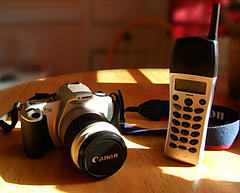Michal Lev-Ram – Business 2.0
 Ten years ago, technologist Philippe Kahn built a makeshift cameraphone in the maternity ward of a Santa Cruz, Calif. hospital, where his wife was in labor with their newborn daughter. Forty-eight hours and a C-section later, a baby was born, and Kahn had invented an easy way to take and, eventually, share photos using a mobile phone. Flash forward to today, and an estimated 40 percent of handsets worldwide have built-in cameras. That means dads all across the globe are now able to shoot and quickly send pics of their newborns. People are using cameraphones as a way to stay in touch with loved ones, report breaking news, and broadcast shocking events such as Saddam Hussein’s recent hanging in Iraq. Through Kahn’s lens, the cameraphone has turned into a huge social tool — and yes, strangely, could someday enable an easy way to conduct in-home urine tests (see below). Kahn is now working on another project, a company called Fullpower Technologies — it’ll be in stealth mode until September, but Kahn says the company is focused on the “convergence of wireless and life sciences” (which could have something to do with urine tests…). In honor of the cameraphone’s 10-year anniversary, I recently talked to the Silicon Valley inventor. Read on for excerpts from my interview with Kahn:
Ten years ago, technologist Philippe Kahn built a makeshift cameraphone in the maternity ward of a Santa Cruz, Calif. hospital, where his wife was in labor with their newborn daughter. Forty-eight hours and a C-section later, a baby was born, and Kahn had invented an easy way to take and, eventually, share photos using a mobile phone. Flash forward to today, and an estimated 40 percent of handsets worldwide have built-in cameras. That means dads all across the globe are now able to shoot and quickly send pics of their newborns. People are using cameraphones as a way to stay in touch with loved ones, report breaking news, and broadcast shocking events such as Saddam Hussein’s recent hanging in Iraq. Through Kahn’s lens, the cameraphone has turned into a huge social tool — and yes, strangely, could someday enable an easy way to conduct in-home urine tests (see below). Kahn is now working on another project, a company called Fullpower Technologies — it’ll be in stealth mode until September, but Kahn says the company is focused on the “convergence of wireless and life sciences” (which could have something to do with urine tests…). In honor of the cameraphone’s 10-year anniversary, I recently talked to the Silicon Valley inventor. Read on for excerpts from my interview with Kahn:
MLR: What do you think about the recent role of cameraphones in “citizen journalism” — like the video of Saddam Hussein’s hanging?
PK: It may not be pleasant, but I believe that the truth is always good. Citizen journalism breaks up the official, government version. And I believe that’s a good thing.
MLR: What can cameraphones do for the developing world?
PK: Many developing countries don’t have free press. Cameraphones can provide a whole infrastructure for reporting events.
MLR: What else will cameraphones enable in the future?
PK: We’ve yet to fully explore medical uses of cameraphones. With a really good camera, you could do a urinalysis, and tell someone if they have a urine infection. That could be a great application for an elderly person who can’t leave home. You could also monitor vital signs. I think we’ll see lots of developments here in the next decade, as cameraphones get better and better.
MLR: Since that day back in 1997, how much money would you say you’ve made off of cameraphones?
PK: We did very well, but we’re technologists. We just love to invent things, and we’re driven by innovation — not money.
Originally Posted at:
http://blogs.business2.com/thirdscreen/2007/01/the_future_of_c.html